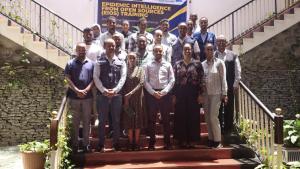Enhancing epidemic intelligence in Ethiopia: lessons from the EIOS capacity-building workshop
Timely detection and response to public health threats are essential to global health security, particularly in countries vulnerable to frequent outbreaks. As part of its ongoing efforts to strengthen surveillance systems in line with the International Health Regulations (IHR 2005) and the Integrated Disease Surveillance and Response (IDSR) framework, the Ethiopian Public Health Institute (EPHI), in collaboration with the World Health Organization (WHO), organized a national training workshop on Epidemic Intelligence from Open Sources (EIOS). The primary objective of the training was to build national capacity to effectively utilize open-source data for real-time epidemic intelligence and evidence-based decision-making.
The workshop was held from March 10–14, 2025, at Kereyu Hill Resort in Adama, Ethiopia, and brought together 22 participants from the Ministry of Health (MoH), EPHI, the IHR, and One Health Office, and other relevant public health sectors. Participants included epidemiologists, data analysts, and emergency coordinators, all of whom engaged in a comprehensive training program combining theoretical instruction with hands-on application of the EIOS platform.
Training sessions covered a wide range of topics, including the fundamentals of public health intelligence, media monitoring, data mining, and outbreak verification. Practical case studies—such as simulated outbreaks of Rift Valley Fever and an unknown respiratory virus—provided participants with real-time scenarios for early warning, risk assessment, and response coordination.
The training yielded several important achievements. It significantly enhanced the technical capacity of participants in detecting and analyzing public health threats through open-source data. The workshop also facilitated the revision of national standard operating procedures (SOPs) related to media monitoring and epidemic intelligence, ensuring they reflect current operational needs. Moreover, it strengthened collaboration among public health, veterinary, and One Health stakeholders, promoting a more coordinated and multisectoral approach to epidemic preparedness. Finally, the training raised awareness of the critical role that open-source surveillance plays in improving national readiness for public health emergencies.
WHO provided technical support and made the EIOS platform available for practical training. Financial backing from the European Civil Protection and Humanitarian Aid Operations (ECHO) enabled the training.
The hands-on approach significantly boosted participant engagement, knowledge retention, and applied skills. While the EIOS platform proved effective, some trainees initially faced challenges with navigation, underscoring the need for ongoing training and follow-up mentoring. Importantly, the workshop reinforced the value of sustained collaboration among MoH, EPHI, WHO, and One Health partners as a foundation for institutionalizing epidemic intelligence within Ethiopia’s broader public health surveillance framework.
Overall, the EIOS capacity-building workshop represented a major step forward in strengthening Ethiopia’s epidemic intelligence and early warning systems. Moving forward, continued technical support, refresher trainings, and stronger intersectoral coordination are recommended to build on these gains. Full integration of EIOS into the national surveillance system will further enhance Ethiopia’s ability to anticipate, detect, and respond effectively to emerging public health threats.



